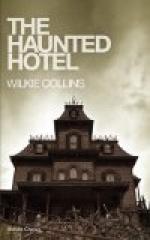Tired and sleepy, he naturally anticipated a good night’s rest. In the thoroughly healthy state of his nervous system, he slept as well in a bed abroad as in a bed at home. Without the slightest assignable reason, however, his just expectations were disappointed. The luxurious bed, the well-ventilated room, the delicious tranquillity of Venice by night, all were in favour of his sleeping well. He never slept at all. An indescribable sense of depression and discomfort kept him waking through darkness and daylight alike. He went down to the coffee-room as soon as the hotel was astir, and ordered some breakfast. Another unaccountable change in himself appeared with the appearance of the meal. He was absolutely without appetite. An excellent omelette, and cutlets cooked to perfection, he sent away untasted—he, whose appetite never failed him, whose digestion was still equal to any demands on it!
The day was bright and fine. He sent for a gondola, and was rowed to the Lido.
Out on the airy Lagoon, he felt like a new man. He had not left the hotel ten minutes before he was fast asleep in the gondola. Waking, on reaching the landing-place, he crossed the Lido, and enjoyed a morning’s swim in the Adriatic. There was only a poor restaurant on the island, in those days; but his appetite was now ready for anything; he ate whatever was offered to him, like a famished man. He could hardly believe, when he reflected on it, that he had sent away untasted his excellent breakfast at the hotel.
Returning to Venice, he spent the rest of the day in the picture-galleries and the churches. Towards six o’clock his gondola took him back, with another fine appetite, to meet some travelling acquaintances with whom he had engaged to dine at the table d’hote.
The dinner was deservedly rewarded with the highest approval by every guest in the hotel but one. To Henry’s astonishment, the appetite with which he had entered the house mysteriously and completely left him when he sat down to table. He could drink some wine, but he could literally eat nothing. ‘What in the world is the matter with you?’ his travelling acquaintances asked. He could honestly answer, ‘I know no more than you do.’
When night came, he gave his comfortable and beautiful bedroom another trial. The result of the second experiment was a repetition of the result of the first. Again he felt the all-pervading sense of depression and discomfort. Again he passed a sleepless night. And once more, when he tried to eat his breakfast, his appetite completely failed him!
This personal experience of the new hotel was too extraordinary to be passed over in silence. Henry mentioned it to his friends in the public room, in the hearing of the manager. The manager, naturally zealous in defence of the hotel, was a little hurt at the implied reflection cast on Number Fourteen. He invited the travellers present to judge for themselves whether Mr. Westwick’s bedroom was to blame for Mr. Westwick’s sleepless nights; and he especially appealed to a grey-headed gentleman, a guest at the breakfast-table of an English traveller, to take the lead in the investigation. ‘This is Doctor Bruno, our first physician in Venice,’ he explained. ’I appeal to him to say if there are any unhealthy influences in Mr. Westwick’s room.’




